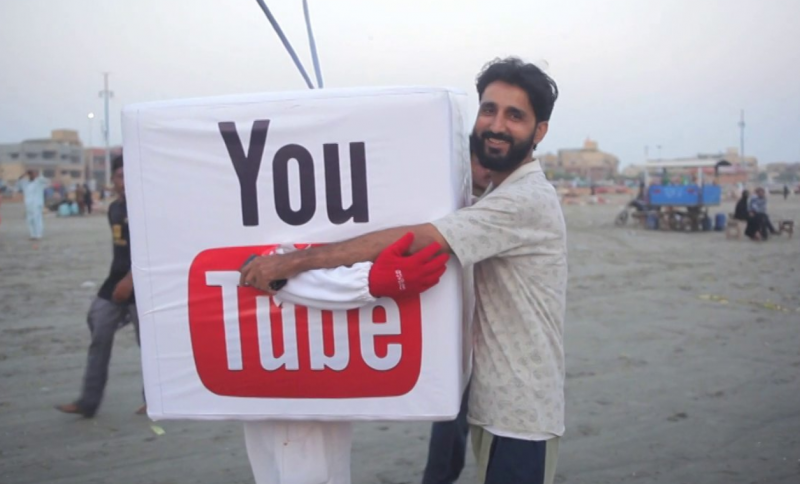
Screenshot of Pakistan For All's video “If you want me back, hug me” protesting Pakistan's YouTube ban.
YouTube has been banned in Pakistan for more than a year, but the love for the video-sharing site in the country has not died. Many Pakistanis use proxy or VPN services to use it.
Speaking up for YouTube is organization Pakistan For All (PFA), a collective of concerned citizens outraged by the persecution of minorities in Pakistan. They are resolved to stand in the way of those that seek to oppress others.
Recently, PFA released a clip on video-sharing site Vimeo to protest the ban. In the video, a YouTube mascot moves through the southern port city of Karachi with a placard, “If you want me back, hug me”.
Global Voices recently talked with Ziad Zafar, a journalist, documentary filmmaker and one of the founding members of PFA.
Global Voices (GV): What was the motivation behind making this video?
Ziad Zafar (ZZ): The motivation was easy. Like all Pakistanis, we are deeply frustrated at being cut off from the world in this manner. YouTube is not only about funny cat videos and fail blogs, (though, God how we miss them!) it is truly a window onto the world and pivotal to how a new generation communicates with itself globally. YouTube allows Pakistanis to participate in a burgeoning global knowledge-economy, where access to information is truly democratic.
Ziad Zafar of Pakistan For All
This is crucial for a country like Pakistan where education is dispensed unevenly and which has one of the largest youth populations in the world. It is criminal for the government to deprive its citizens of such an important resource.
The video is part of a campaign called #KholoBC which is run by Pakistan For All, of which I am a member. We are opposed to all forms of state censorship and content regulation on the Internet. We want to make Pakistanis aware that there is a concerted and insidious effort underway to undermine our online freedoms using the smokescreen of national security and religion.
A lack of organised resistance against state censorship has visibly emboldened the administration to clamp down further on online freedoms.
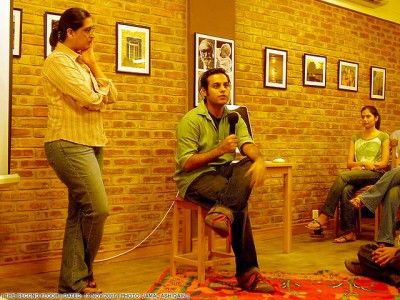
Co-founder of PFA Sabeen Mahmud (left) and Ziad Zafar
In March 2012, the Pakistani government took the decision to purchase and install a nationwide content-filtering service which would operate on similar lines to China's Golden Shield or “Great Firewall” This Filtering Tool has been purchased from a Canadian company called ‘Netsweeper‘ and installation of this system has been completed in recent weeks. We believe this is a very ominous development for the future of online freedoms in Pakistan and that citizens should be aware of this.
Hugs for YouTube! #KholoBC from Ziad Zafar on Vimeo.
GV: It is a very interesting anti-censorship campaign. Where did the idea come from?
ZZ: One of the primary reasons we wanted to do this was, that we wanted to alert people's attention to the fact that the YouTube ban does not arise out of public or moral pressure. While the initial pretext may have been blasphemous content, the administration views YouTube and other social media instruments as subversive tools, and so are keen to go on suppressing them. From the Arab spring to Occupy Wall street, YouTube and other forms of social media have been central to a new wave of social movements that have swept the globe in recent years. The mindset in the bureaucratic-administration in Pakistan is cognisant of this, and so there is no real appetite to re-open the video sharing website.
#KholoBC is a Pakistan for All campaign opposed to all forms of state censorship and content regulation on the Internet.
It is important to note that other than initial global protests following the release of the film ‘Innocence of Muslims’ there has been virtually no public pressure brought on the government from political or religious circles to uphold the ban. Most Pakistanis want YouTube back . It is revealing to look at the index of most visited websites in Pakistan, the top 3 are proxy websites! This means that the majority of people logging on to the net are trying to bypass government controls.
GV: Are you planning to take your YouTube mascot to other cities?
ZZ: We have several other ideas in the pipeline for the #KholoBC campaign, and yes, Youtube will be making a return appearance at some point.
GV: what is the reaction in Pakistan?
ZZ: To be honest, we were a bit apprehensive at the beginning, fearing an adverse reaction from some religious nut, but the response was overwhelmingly favourable. It was such relief to be able to see ordinary citizens express themselves openly despite a creeping mood of fear and censorship that is taking grip in Pakistan. While there maybe antipathy towards YouTube from some religious sections, the vast majority of Pakistanis understand that YouTube is not synonymous with blasphemous content.
GV: Please describe how this citizens’ initiative Pakistan For All works.
ZZ: Pakistan for All is a broad based alliance of citizen and community groups fighting for progressive and working class issues. We believe strongly in direct-action and feel that in order to achieve any measure of success we have to galvanise ordinary citizens to fight for themselves and each other. We are encouraging people to get involved, to get political and be part of the pushback.
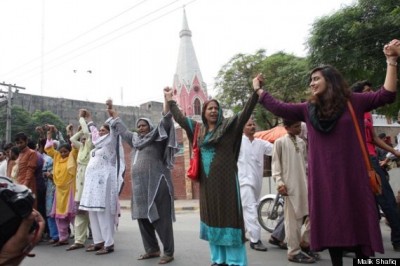
Human chain in Karachi in solidarity with the minorities of Pakistan.
GV: How many citizens are involved with you in your activities?
ZZ: We are a voluntary organisation supported by ordinary citizens. Dozens of people have been involved in our efforts so far, and we are steadily developing a large nationwide network.
GV: Earlier, Pakistan For All held a human chain campaign in Karachi, Lahore and Islamabad? What was that experience like?
ZZ: Our group asked Pakistani Muslims to come forward and offer themselves as human shields to protect Christians during mass in the aftermath of the Peshawar church bombing that killed 85 people. Hundreds of ordinary citizens responded to our call and formed the shield in three cities. Since then we have had countless messages of support and solidarity by citizens expressing a desire to be a part of our efforts and the group is growing everyday.

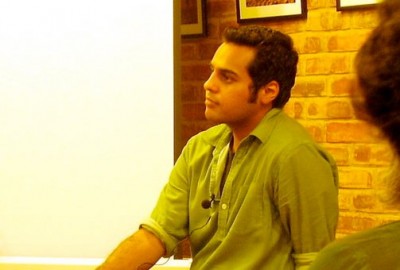
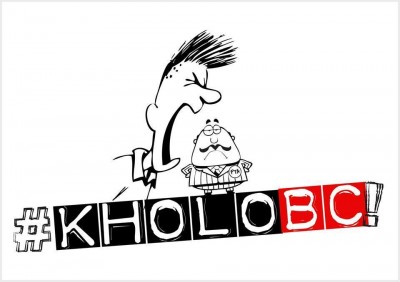






10 comments